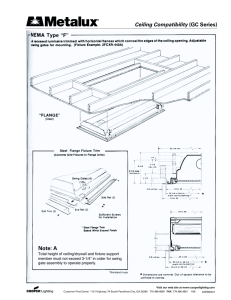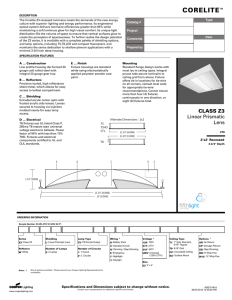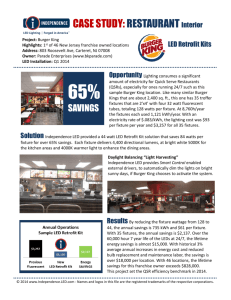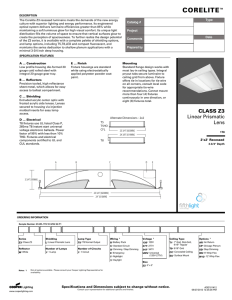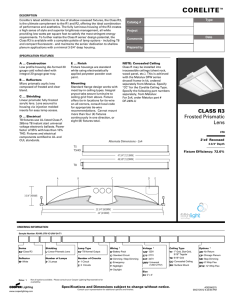Fire Rated Fixtures
advertisement
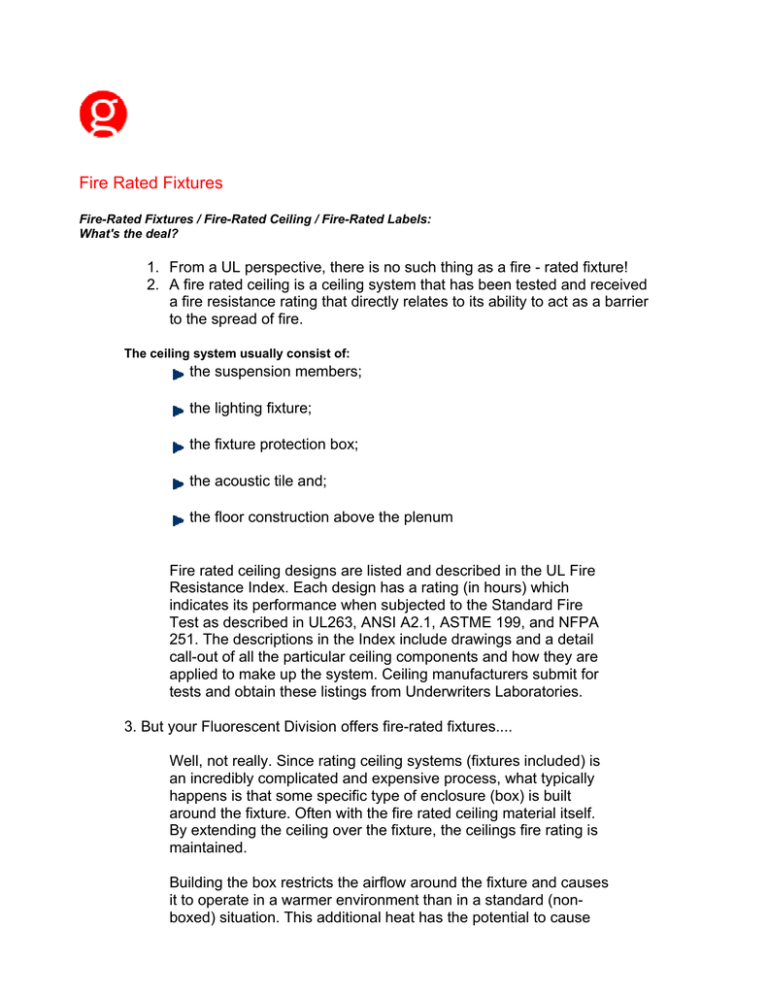
Fire Rated Fixtures Fire-Rated Fixtures / Fire-Rated Ceiling / Fire-Rated Labels: What's the deal? 1. From a UL perspective, there is no such thing as a fire - rated fixture! 2. A fire rated ceiling is a ceiling system that has been tested and received a fire resistance rating that directly relates to its ability to act as a barrier to the spread of fire. The ceiling system usually consist of: the suspension members; the lighting fixture; the fixture protection box; the acoustic tile and; the floor construction above the plenum Fire rated ceiling designs are listed and described in the UL Fire Resistance Index. Each design has a rating (in hours) which indicates its performance when subjected to the Standard Fire Test as described in UL263, ANSI A2.1, ASTME 199, and NFPA 251. The descriptions in the Index include drawings and a detail call-out of all the particular ceiling components and how they are applied to make up the system. Ceiling manufacturers submit for tests and obtain these listings from Underwriters Laboratories. 3. But your Fluorescent Division offers fire-rated fixtures.... Well, not really. Since rating ceiling systems (fixtures included) is an incredibly complicated and expensive process, what typically happens is that some specific type of enclosure (box) is built around the fixture. Often with the fire rated ceiling material itself. By extending the ceiling over the fixture, the ceilings fire rating is maintained. Building the box restricts the airflow around the fixture and causes it to operate in a warmer environment than in a standard (nonboxed) situation. This additional heat has the potential to cause the ballast's integral thermal protector to trip, which de-energizes the fixture and makes it start cycling. Back many years ago when less efficient (and by definition, hotter running) ballasts were the norm in fluorescent fixtures, the fluorescent division's answer to the problem described in the above paragraph was to place a "premium" (more efficient / cooler running) ballast in the fixture. They created the "FR" (firerated) option to allow customers to specify this configuration, and places a Lithonia label (not a UL label on the fixture that stated "This troffer is specially designed to be installed in fire-rated ceilings". With energy saving (cooler running) ballasts now required on all fluorescent fixtures, the only difference between a "standard" troffer and one with the "FR" option is the label. In fact, the fluorescent division will send you out some to put on your fixtures in the field, if you like. 4. So what does that mean for Recessed Downlighting or Gotham relative to recessed fixtures? In a nutshell, it means our standard fixtures are OK to use in fire-rated ceilings. UL already made us test our fixtures -- ballasted and otherwise -- in a box that's only 1/2" larger on all sides than the fixtures, and they work fine in that environment. Of course UL specifies a laboratory test condition of 25° C (77° F). Since plenum temperatures often exceed that in the real world, we recommend 6" between the fixture and the box on all sides and 12" over the top. If those dimensions won't work, build a box of the same volume with a least 3" clearance on the sides and 1" clearance on the top. If space limitations preclude a box this big, consult factory for minimum recommendations for your specific fixture and application. For more information, contact Gotham technical support. Gotham Lighting 1400 Lester Road Conyers, GA 30012 770-922-9000
